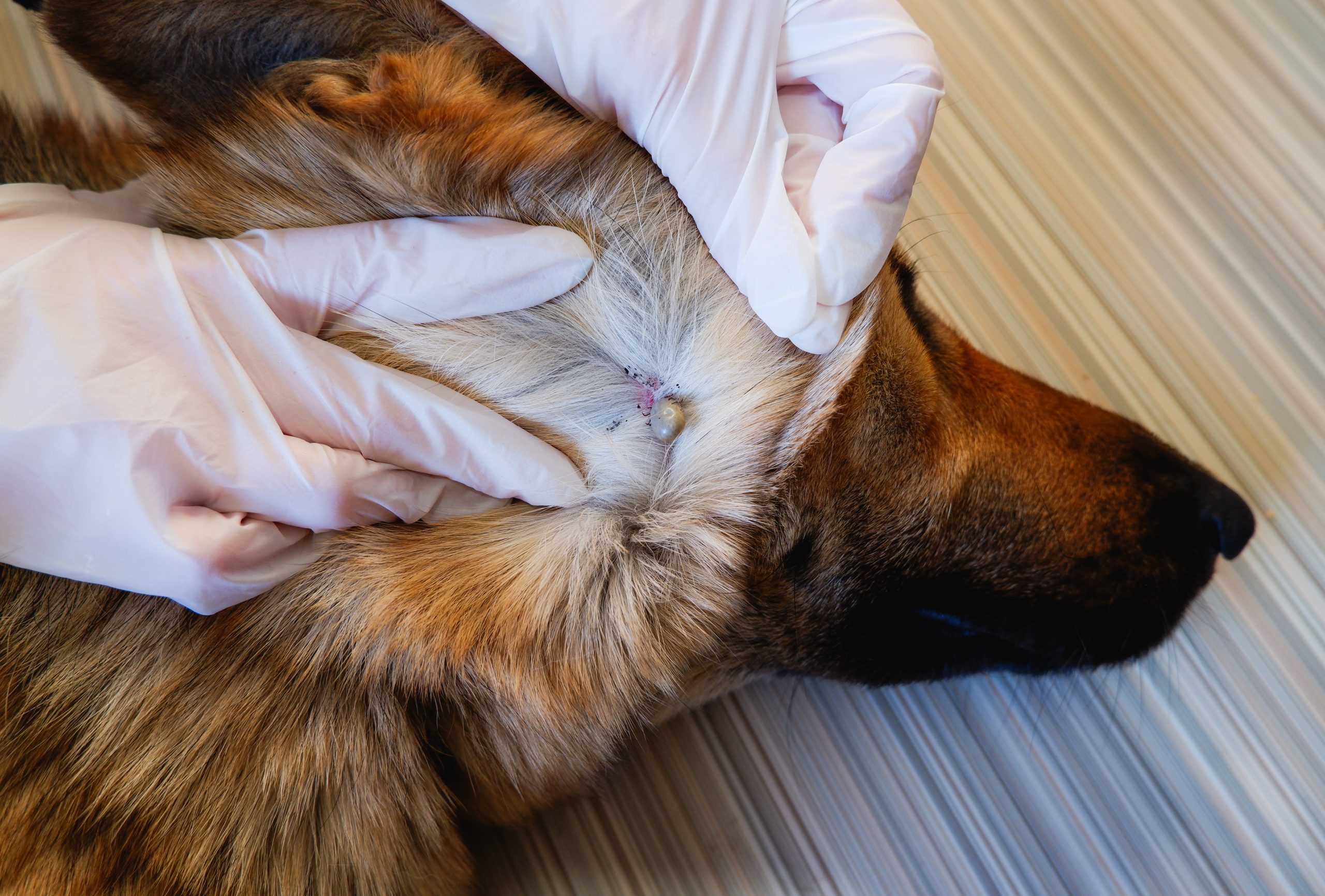Tick-Borne Disease in Dogs: Causes & Treatment

Ticks may be tiny, but they can cause big problems for your dog. These little pests can carry bacteria, viruses, and parasites that lead to serious illnesses in our canine companions. As a dog parent, being informed about the dangers ticks pose—and how to prevent them—is one of the best ways to keep your pet happy and healthy.
Let’s walk through what you need to know to protect your dog from tick-borne diseases, recognize symptoms early, and take action quickly if needed.
Why Ticks Are a Problem for Dogs
Ticks love warm, humid areas and are commonly found in wooded spots, tall grasses, and even your backyard. They latch onto dogs to feed on their blood, and in the process, they can transmit harmful diseases. As tick populations grow, thanks to changing climates and shifting habitats, the risk to pets increases, too.
Knowing which diseases ticks can carry, how to spot them, and how to protect your pup is essential. Think of it as part of your regular pet-care routine—just like feeding, walks, and playtime.
Common Tick-Borne Diseases to Watch Out For
Here are a few of the most common illnesses that ticks can pass on to dogs:
- Lyme Disease: Spread by the black-legged (deer) tick, this disease can cause joint pain, fever, and tiredness. Left untreated, it may lead to more serious health issues like kidney problems.
- Anaplasmosis: Also spread by the deer tick, anaplasmosis can make your dog feel achy and feverish, and lose interest in food. Some dogs also show signs of breathing trouble or neurological changes.
- Ehrlichiosis: Passed along by the brown dog tick, this disease can cause weight loss, bleeding problems, and swollen lymph nodes. If it becomes chronic, it may lead to more severe conditions like anemia or organ damage.
What Symptoms Should You Look For?
Many tick-borne diseases come with vague symptoms that could easily be mistaken for something else, such as::
- Fever
- Fatigue or weakness
- Loss of appetite
- Joint stiffness or limping
- Swollen lymph nodes
- Bleeding issues or bruising
How Ticks Spread Illness
Ticks pass on disease while feeding. Once they bite and latch onto your dog, their saliva can carry harmful pathogens into your dog’s bloodstream. The longer a tick stays attached, the greater the risk of infection. That’s why regular tick checks and prompt removal are so important.
Different ticks carry different diseases, and they’re active at different times of the year. Ask your vet which types are common in your area so you can stay ahead of the game.
Treatment and Recovery
If your dog does end up with a tick-borne illness, don’t worry—many are treatable, especially when caught early.
- “Antibiotics: An antibiotic called doxycycline is commonly used to treat Lyme disease, anaplasmosis, ehrlichiosis, and Rocky Mountain spotted fever. It is generally given for at least three to four weeks to eliminate the bacterial infection.
- Antiprotozoal medications: Dogs with babesiosis are treated with an antiprotozoal medication called imidocarb dipropionate. Hepatozoonosis is typically treated with pyrimethamine, as well as the antibiotics trimethoprim-sulfa and clindamycin.
- Anti-inflammatories: Some dogs may benefit from corticosteroids, such as prednisone, or non-steroidal anti-inflammatories (NSAIDs) to reduce inflammation and relieve pain and discomfort.” (as it’s written in the PetMD article by Brittany Kleszynski, DVM).
Simple Steps to Prevent Tick Problems
There’s a lot you can do to help keep ticks away from your dog. Here are some easy strategies:
- Keep Your Yard Tidy: Mow your lawn regularly, clear away leaf piles, and trim bushes to reduce tick hiding spots. If your yard borders a wooded area, a gravel barrier can help discourage tick movement.
- Check Your Dog Often: Especially after outdoor adventures, do a quick tick inspection. Look around the ears, neck, underarms, belly, and between the toes—these are tick favorites.
- Use Tick Preventives: There are lots of options, including collars, spot-on treatments, and chewables. Your vet can recommend the best one for your dog’s lifestyle and needs.
If You Find a Tick, Here’s How to Remove It Safely
If you find a tick on your dog, stay calm and remove it as soon as possible. Here’s how:
- Use Fine-Tipped Tweezers or a Tick Tool: Grasp the tick as close to your dog’s skin as possible.
- Pull Straight Out: Apply steady, gentle pressure. Don’t twist—this can cause parts of the tick to break off.
- Clean the Area: Use antiseptic on the bite and wash your hands.
- Dispose of the Tick Safely: Drop it in alcohol or flush it down the toilet.
Regular Vet Visits Matter
Just like with people, routine checkups can catch problems before they become serious. Your vet can run blood tests to screen for hidden infections, even if your dog isn’t showing symptoms yet.
They’ll also help you choose the best preventive products and offer advice tailored to your dog’s unique health and habits.
How Can Pet Insurance Help You if Your Dog Needs Treatment?
Pet insurance can be a valuable tool in managing the costs of treating a dog’s veterinary expenses. By having a pet insurance policy in place, you can have peace of mind knowing that you can provide medical care for your furry companion without worrying about the financial burden. Pet insurance can help cover the costs of veterinary consultations, diagnostic tests, medications, and even specialized treatments if required.
Reimbursement
This method is the most common for pet insurance companies. You pay out of pocket for the veterinarian bill, and then the insurance company reimburses you for what’s covered under the insurance plan. The steps look like this.
- You pay the vet bill after your dog’s visit.
- You fill out the pet insurance claim form.
- Submit the claim form and other required documentation to the insurer.
- After the claim is approved, you will be reimbursed for eligible expenses.
What Does Odie Pet Insurance Cover?
Pet insurance covers various veterinary expenses, providing financial protection and peace of mind for pet owners. Here are the details of the coverage options offered by Odie Pet Insurance:
Illness & Injury Plan
The Illness & Injury Plan is an all-inclusive insurance plan designed to cover a wide range of medical needs for your pet. This plan includes comprehensive coverage for various illnesses, injuries, and veterinary services. Some of the covered items include:
- Veterinary exams and consultations
- Diagnostics (e.g., X-rays, lab tests)
- Prescribed medications
- Surgeries and hospitalization
- Rehabilitation, acupuncture, or chiropractic treatments
- Medically necessary supplies
The Wellness Plan
The Wellness Plan is a monthly membership that focuses on preventive care and covers routine veterinary services.
- Provides reimbursements for routine care items such as wellness visits (exams and vaccines), testing and parasite prevention, dental cleanings and at-home dental care, vitamins, supplements, and more.
- Through Odie’s partnership with Petivity, a leader in smart pet products and proactive care, Wellness Plan members can also receive reimbursements for Petivity devices and health kits, as well as eligible Purina food and supplements.
- Total reimbursement up to $700 per year.



